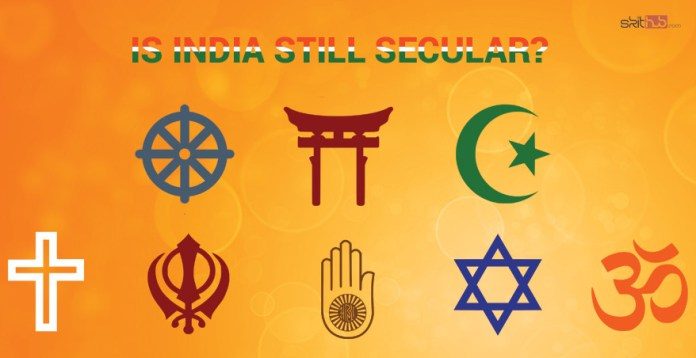This article is written by Jisha Garg, a student currently pursuing B.A.LLB (Hons.) from Rajiv Gandhi National University of Law, Punjab. This is an exhaustive article questioning the status of India as a secularist country. The article puts forward various recent incidents of rising Islamophobia in the country. It also highlights the government’s response to such incidents and the reaction of the international community on such incidents of rising islamophobia.
Table of Contents
Introduction
One of the biggest achievements of the Union of India post-independence is that it has managed to stand united in the face of striking religious diversity. Secularism in India reflects the vision of the constitution-makers although the word ‘secular’ was not present in the original draft of the constitution. The word ‘secular’ was added to the preamble of the Constitution through the 42nd Amendment Act in 1976. Secularism means everybody in the country to practise and profess their religion and the State would not have a state religion.
Secularism has been highly valued since independence because it has been considered to hold the country’s disparate communities together under one roof. Secularism came under threat after independence when parties started garnering votes on the basis of religion and various extremist groups came into existence. Religion was used as a political weapon to garner popular support although the first Prime Minister of the country Jawaharlal Nehru propagated the idea of separating religion from politics. One of the major incidents that was considered as a major turning point in the history of Secularism in India was the demolition of Babri Masjid under the aegis of the BJP government in Gujarat. The issue was addressed in the Supreme Court of India in 1994 in S.R. Bommai v. Union of India case. In this case, the court held that Secularism is one of the basic features of the Constitution of India, thus implying that the state has no right to favour or disfavour any religious sect.
Although Secularism is a principle enshrined in the Constitution of India, the recent incidents have called into question the future viability of the country’s secularist tradition and commitment to diversity. The article attempts to analyse the recent events happening in the country that are undermining secularism in the country and giving rise to Islamophobia which is a principle against the constitutional ethos.
Cow vigilantism and mob lynchings
In September 2015, a mob attacked and killed a 52-year-old-man, Mohammad Akhlaq, pulling him out of his home in a village near Delhi, India, on suspicions of eating beef. This was not an isolated attack but it was one of the first attacks in the future chain of such incidents targeting Muslims. According to a report conducted jointly by the Mumbai-based Centre for Study of Society and Secularism (CSSS) and the UK-based Minority Rights Group International (MRG), these attacks on Muslims were often led by extremist right-wing groups claiming to be cow protection squads. The report said that the government’s inaction to look into matters of communal lynchings “created a climate of impunity.”
A study conducted by IndiaSpend is indicative of the growing Islamophobia in the country defeating secular ethos of the Constitution. The study recorded 66 hate crimes, 97 percent of which were reported after the pro-Hindu nationalist BJP came to power in 2014. The mob lynching for the alleged protection of cows, which is considered sacred in Hindu traditions, is clearly indicative of the growing intolerance in the country towards the Muslim minority community. Also, the governments labelling the situation as a mere law and order situation is proving to be destructive for the secular fabric of the country and giving rise to Islamophobia.
The Supreme Court in the case of Tehseen S. Poonawalla v. Union of India and Ors, pronounced a judgment relating to the rising cases of mob violence in the name of cow vigilantism on 17th July, 2018. The Supreme Court empathetically stated that it is the duty of the state to maintain peace through the effective working of the government machinery “so as to preserve our quintessentially secular ethos and pluralistic social fabric in a democratic set-up governed by rule of law”. The court also suggested the government to formulate a national legislation against mob lynching, which has not been formulated till date.
The rising cases of mob lynchings against the minority religion for the protection of cows sacred to Hindus and the government’s inaction in addressing the issue timely despite the Supreme Court orders are leading to a loss of trust of the minority community on the government of the country who are considered as guardians of the constitution.
Rise in religious hate crimes
A study relating to the occurrence of religious hate crimes was recently conducted by an initiative named Citizen’s Religious Hate Crimes Watch which was launched on 30th October, 2019. It has analysed 254 hate crimes targeting a particular religious community between 2009 and 2018 which resulted in 91 deaths and 579 injuries. What is even more surprising is that 87% of the total reported incidents relating to cow violence were against Muslims which is a religious minority in India. Muslims, who comprise 14% of India’s population, were the victims in 62% of cases of religious violence recorded by Hate Crimes Watch, since 2009. However, Hindus, who comprise more than 80% of India’s population, were victims in only 10% of the crimes relating to religious hatred, since 2009.
It is also surprising to note that in 86% of the cases relating to religious hate crimes, the alleged perpetrators belonged to the Hindu Religion. It is evident from the report of the Citizen’s Religious Hate Crimes Watch, the crimes against the minorities has risen, since the year 2009. The rise in cases has been attributed to the government’s inaction and has resulted in an atmosphere of fear for the religious minorities of the country. Although, there are a considerable number of provisions in the Indian law providing for the arrest of such criminals including Section 46 of the Criminal Procedure Code, the police administration has failed to take action against them due to lack of awareness.
The effect of CAA-NRC
The government of India recently came up with an Act known as the Citizenship Amendment Act on 12th December, 2019. The act makes illegal migrants living in India from Pakistan, Afghanistan, and Bangladesh who belong to Hindu, Sikh, Buddhist, Jain, Parsi, and Christian religious communities eligible for Indian Citizenship. The Act was a source of controversy due to the exclusion of the Muslim refugees from the Act. It was a student-led protest which started with the Aligarh Muslim University (AMU) and was subsequently followed by a country-wide protest. The protests were met by police brutality followed by internet shutdowns in the affected areas.
The government defended the Act by stating that the Act was to provide citizenship to the persecuted minorities from the aforementioned countries. However, various analysts have pointed out that the Act excluded those countries in which the victims of persecution included Muslims like in Sri Lanka and Myanmar. The Indian Constitution embeds the principle of secularism and entitles every person in India to the equal protection of Law. The CAA plainly contradicts the important constitutional principle because the government has failed to provide any constitutionally adequate rationale for certain illegal migrants differently based on their religion.
Another aspect of the anti-CAA protests were the unresponsive statements by members of the ruling Government which has further aggravated the fear amongst the minority Muslim community. This includes the remarks by a BJP Minister, Anurag Thakur who said “shoot the traitors” and a remark by the Bengal BJP President Dilip Ghosh who threatened to shoot the protestors like dogs. What is even more surprising is that out of the 25 instances of hate speeches in December, FIR’s were present in only three cases.
The issue of Tablighi Jamaat-communalising a pandemic
With the world fighting an invisible enemy known as the coronavirus, there are some who are giving communal colour to the pandemic. The controversy started about an incident which happened a few days after the Prime Minister of the country announced a nationwide lockdown on 24th March, 2020. It was related to the congregation of devotees at Delhi’s Nizamuddin Markaz even after the Delhi government’s ban on the meetings of more than 50 people on 16th March. Later, it was found that many people who attended the congregation tested positive for CoronaVirus. The incident was given a communal rancour and was used as a tool for targeting the minority community by various media houses. Across the country, the Muslim community was attacked, ostracised and labelled as the sole source for the spread of the deadly virus. It has also alleged that the incident was used by the government to release the hidden corona figures in the country. This incident was not an isolated event. Another similar gathering of devotees took place at the Tirupati Temple but the incident did not garner national attention. Although both were Acts of criminal negligence, the gathering of Tablighi Jamaatis was subjected to social ostracization also.
The incident was used as a tool to shift the government’s responsibility from the rising number of coronavirus cases by scapegoating Muslims. In a country where the constitution restricts any discrimination on the basis of religion, targeting one particular community and blaming them for a pandemic ignoring other such incidents involving people from the majority community, will create an atmosphere of distrust amongst various communities harming the principle of secularism.
The response of the international community
Incidents happening within national borders are never isolated events because states are part of a global community where national decisions are observed and analysed by the global community. The international community has also expressed their opinions on the aforementioned incidents and have expressed concern on the rising Islamophobia in the country which endangers secularism.
The response on religious hate crimes
The US Commission for International Human Rights had condemned the lynching of a 24-year old Muslim man, Tabrez Ansari who was allegedly killed for the possession of beef by a group of cow vigilantes. The commission advised the government to take cognisance of such hate crimes and formulate a national policy against it. The issue of mob lynchings and hate crimes was also taken up by the UN Human Rights Council on the request of the Centre of Africa Development and Progress, South Africa.
Even the Amnesty International has made a website named ‘halt the hate’ after the death of Mohammad Akhlaq, for reporting various religious hate crimes in India. It has reported a total of 902 hate crimes in India between September, 2015 and June, 2019. The organisation has also remarked that in order to address the issue of rising hate crime in the country, it is essential that such penal laws be formulated that are free of bias and based on the principles of Secularism.
The response on the issue of Tablighi Jamaat
The Organisation of Islamic Cooperation and various Arab countries have condemned the various Indian nationals for blaming the Tablighi Jamaatis for exacerbating the pandemic in India. The issue became a controversy after Sourabh Upadhyay, an Indian national working in the UAE passed racist comments against Muslims for spreading the Corona Virus in India. He also referred to the Jamaatis as “radical Islamic terrorists”.
Conclusion
Secularism as a principle was envisaged in the Indian Constitution in order to unite the people from various religions. This was due to the inherent fears in the minds of the Constitution makers after the country saw a bloody partition based on religion. However, various political changes and rise in extremist groups led to the slow erosion of the secular fabric of the country.
The increase in the number of religious hate crimes, mob lynchings, introduction of CAA and the issue of Tablighi Jamaatis are some of the many recent events that have posed a serious threat to secularism in the country and given rise to islamophobia amongst the people of the country. Rising Islamophobia in the country is a threat to religious minorities in the country and can have adverse repercussions on the future of the country. It can lead to another war based on religion which the country cannot afford.
The government needs to take urgent cognisance of the cases of attack on religious minorities in the country, formulate laws favouring people of all religions in order to safeguard the vision of the Constitution makers and tackle the rising Islamophobia in the country.
References
- https://www.aljazeera.com/news/2019/12/india-anti-muslim-citizenship-bill-191209095557419.html
- https://theprint.in/opinion/global-print/gulf-calls-india-without-islamophobia-jaishankar-works-phones/410159
- https://www.washingtonpost.com/graphics/2018/world/reports-of-hate-crime-cases-have-spiked-in-india
- https://thewire.in/communalism/covid-19-tablighi-jamaat-hindu-musli
- https://www.thehindu.com/news/national/islamophobia-is-rising-in-india-says-organisation-of-islamic-cooperation/article31383624.ece
LawSikho has created a telegram group for exchanging legal knowledge, referrals and various opportunities. You can click on this link and join:
 Serato DJ Crack 2025Serato DJ PRO Crack
Serato DJ Crack 2025Serato DJ PRO Crack











 Allow notifications
Allow notifications


